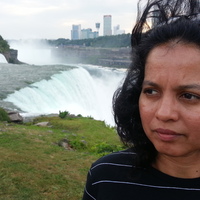
Deep J Gurung
Deep Jyoti Gurung, Ph.D., is an Assistant Professor at CHRIST University, Bengaluru (India). His research interest focuses on the impact of technology on tourism. His doctoral research investigated the role of user-generated content on destination marketing. Deep is interested in the field of consumer behavior and tourism marketing. He has various published research articles in many international journals. He has also authored and co-authored many book chapters published with international publishers. He also serves as conference proceedings chief editor of the International Tourism Studies Association. He is also a member of the International Journal of Tourism Cities review committee. He is also a lifetime member of the Indian Commerce Association.
Address: Department of Commerce
School of Commerce, Finance and Accountancy
Central Campus
CHRIST (Deemed to be University)
Bengaluru
Address: Department of Commerce
School of Commerce, Finance and Accountancy
Central Campus
CHRIST (Deemed to be University)
Bengaluru
less
Related Authors
Purnima Barman
Gauhati University
Dr. Parmita Khakhlari
DIBRUGARH UNIVERSITY
Niranjan Das
Gauhati University
Toolika Gupta
University of Glasgow
Rishma Basumatary
Cotton University
InterestsView All (10)







Uploads
Papers by Deep J Gurung
Tourism Cities (IJTC), the structure of knowledge in city tourism research and the prevalent themes and trends arising fromIJTC.
Design/methodology/approach – A bibliometric analysis was conducted to scrutinize the publication patterns in IJTC. This involved examining parameters such as the annual count of published articles, the keywords used in themand their respective authors.
Findings – The findings reveal that IJTC has a growing and diverse publication output, establishing itself as a reputable and influential publication within urban tourism research. The results reflect various
aspects and themes in city tourism research.
Research limitations/implications – The study has certain limitations. The data used for analysis was obtained exclusively from the Scopus database. The analysis was conducted using only one software
package, Bibliometrix. Other software packagesmay offer different features for bibliometric analysis. The study relied exclusively on quantitative methods for data analysis. Qualitative methods could have
provided more nuanced interpretations of the data.
Practical implications – Comparative analyses could be conducted between IJTC and other journals within urban tourism or related disciplines. Such research would yield valuable insights into the current
state of the field and aid in identifying areas warranting further investigation.
Social implications – The findings from this study can inform the decisions and actions of various stakeholders involved in urban tourism. Practitioners and policymakers can draw from this research to
make informed decisions. Existing and emerging authors can identify relevant topics for their research. Readers can access pertinent information for their needs.
Originality/value – This study offers a unique contribution by thoroughly comprehending the performance of IJTC between 2015 and 2023. It progresses the existing body of knowledge on city tourism research by examining its current status and future trends.
Tourism Cities (IJTC), the structure of knowledge in city tourism research and the prevalent themes and trends arising fromIJTC.
Design/methodology/approach – A bibliometric analysis was conducted to scrutinize the publication patterns in IJTC. This involved examining parameters such as the annual count of published articles, the keywords used in themand their respective authors.
Findings – The findings reveal that IJTC has a growing and diverse publication output, establishing itself as a reputable and influential publication within urban tourism research. The results reflect various
aspects and themes in city tourism research.
Research limitations/implications – The study has certain limitations. The data used for analysis was obtained exclusively from the Scopus database. The analysis was conducted using only one software
package, Bibliometrix. Other software packagesmay offer different features for bibliometric analysis. The study relied exclusively on quantitative methods for data analysis. Qualitative methods could have
provided more nuanced interpretations of the data.
Practical implications – Comparative analyses could be conducted between IJTC and other journals within urban tourism or related disciplines. Such research would yield valuable insights into the current
state of the field and aid in identifying areas warranting further investigation.
Social implications – The findings from this study can inform the decisions and actions of various stakeholders involved in urban tourism. Practitioners and policymakers can draw from this research to
make informed decisions. Existing and emerging authors can identify relevant topics for their research. Readers can access pertinent information for their needs.
Originality/value – This study offers a unique contribution by thoroughly comprehending the performance of IJTC between 2015 and 2023. It progresses the existing body of knowledge on city tourism research by examining its current status and future trends.
The paper attempts to explore the potentiality of the indigenous knowledge of Mayong village in herbs and traditional healing practices to attract tourists and promote rural health tourism.
Keywords: indigenous knowledge, Mayong, rural tourism, health tourism
ISBN 978-93-84869-10-6
ISBN: 97893-85000-05-8